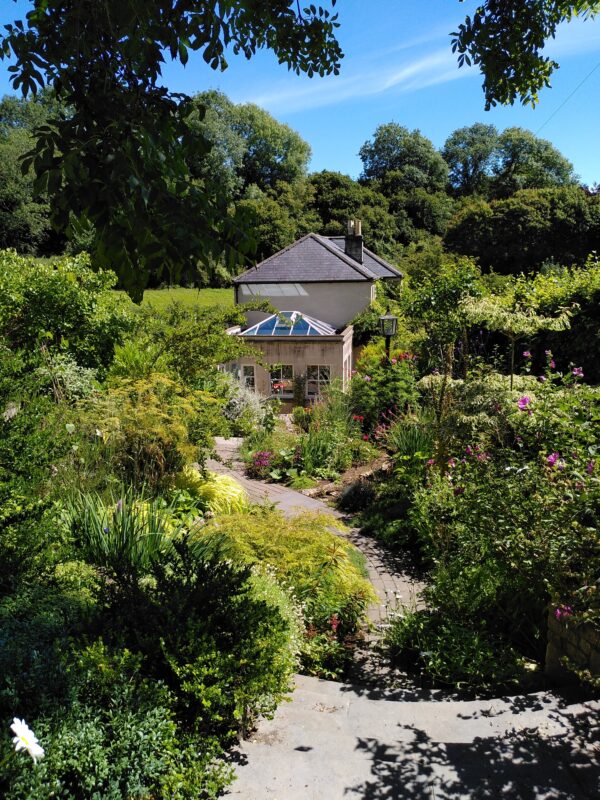
Today we’ve got the good fortune and privilege of a guest post from my friend, Marchelle. AKA @afroliage on Instagram, she writes from her garden in the English countryside, and is a wonderful essayist. I’m so happy to have her on this blog. Spoiler alert: this is about more than gardening.
How to garden
How did you learn how to garden? The question throws me and I realise I don’t know the answer. Yes, I bought and borrowed books, most of which I have never fully read. Certainly, I have imbibed seasons of comforting British gardening television, mostly when I had no garden. Without doubt I grew up in a garden, the exotic backdrop to my tropical childhood dreamscape. But it is unclear how much of that applies to how I relate to my English country garden now.
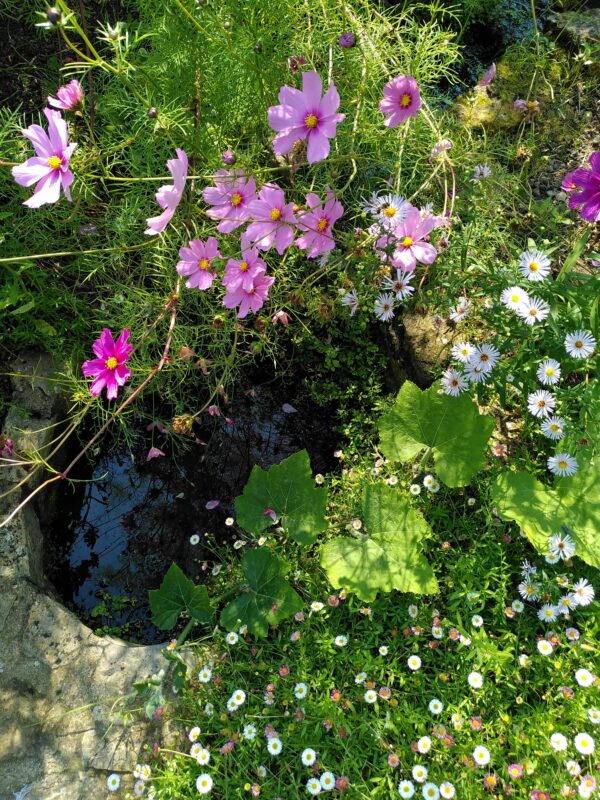
How do I garden? I go out into my garden and wander through it. I stand and stare. I listen to the water. I am distracted from my thoughts by the children. I peer at the soil, stick my fingers in it. I feel the light, notice shade. I drink cups of tea in appealing spots and wish for a chair. I clear up ever evolving piles of sticks and stones, am called to exclaim over a constant stream of wonders and treasures. I examine emerging seedlings, take photos of them on my phone, return near the house in the hope that wifi and an app will teach me their name. Gradually I learn them, which are so-called weeds. Some I remove – I spend weeks chasing bindweed roots through soil – others I decide that I like and will welcome. Some, like Herb Robert or Hairy Bittercress because they are pretty & fill gaps usefully, some, like Enchanter’s Nightshade because of the sheer whimsy of their name.
I check which are edible or useful in teas. Always, the teas. I come across small abandoned gardening gloves and trowels. I think that I ought to try harder to know which weeds are beneficial to the garden’s insects and wildlife. I dream and scheme and plan.
I believe that I do not know what I am doing and feel completely overwhelmed. We are locked down and so am I – I feel frozen for a time. I read that I ought not to do anything at all in a new garden for the first year and ignore that advice. It galvanises me. I decide to start with one patch that I will pass through daily. I start with the soil. I get as much mulch as I can afford and huffingly sweat in the winter air as I haul it up the equivalent of several flights of stairs to spread it as thickly as I can. I resent a popular expert gardener’s advice that it’s not worth doing if you can’t do it properly. I do what I can anyway and notice that every little helps.
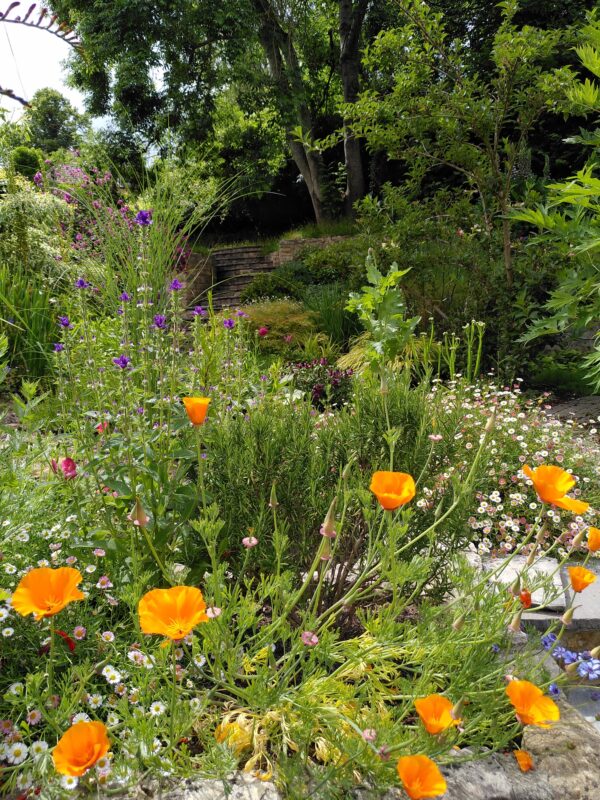
I buy seeds, randomly choosing whatever appeals most. I get some from swaps, I accept whatever I am given. I sow them, the children with me. The children are always with me now, the garden our classroom, kitchen, playroom, asylum. We marvel when things germinate, squint and wince while attempting to delicately prick them out, plant on the ones that delight us and grow. I decide that is quite a palaver, vow to get more perennials, and scatter some seed randomly. I enjoy a surprise. I take more perennials from the garden. I lift a sickly astilbe, get bitten by ants fleeing the nest in its roots – problem diagnosed – divide the clump and distribute the plants elsewhere. Some do well, others I vow to move again next autumn.
I make more perennials from the garden, taking cuttings and surprising myself with their success rate. I understand why gardeners are aways so keen to give away plants. I plant out some of the many friends that we have carried with us too tightly bound in pots for years. They sigh into growth when released into the beds. I plant densely, hoping only to place plants where they might be happy, but without too much conscious consideration towards design. Carnival is my inspiration and my goal, every bed destined for bacchanal. The plants romp and frolic and look a glorious jumble anyway.
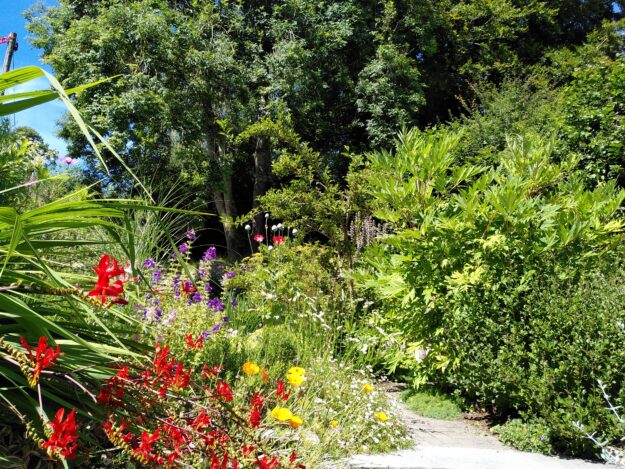
Summer arrives and in the heat I do very little. Occasionally I deadhead by cutting flowers for my pleasure indoors. I look and smell and touch and am soothed. Occasionally the oppressive feelings caused by all that there is in the wider world ease enough to allow me to revel in delight. I harvest things. I pick mint and lemon balm and pelargonium for refreshing evening drinks. I scatter rose petals and nasturtiums on my plate. I eat and drink beauty.
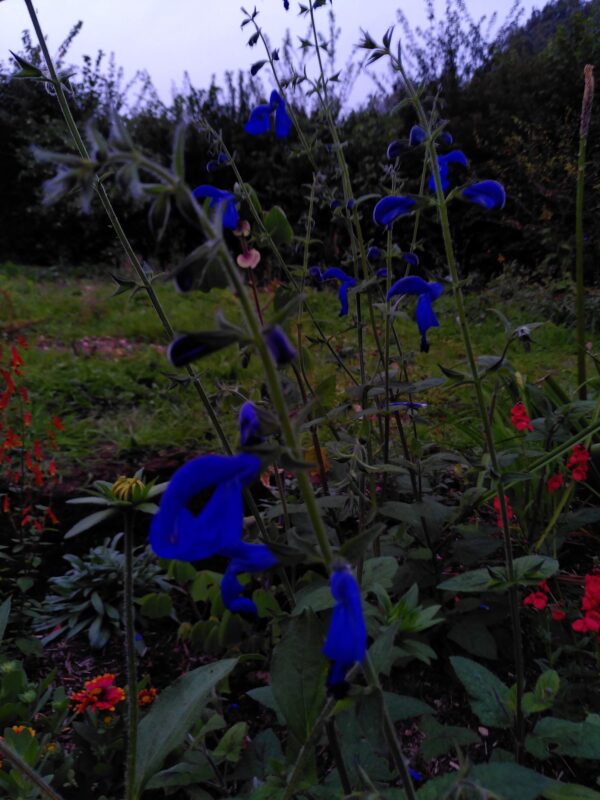
The season turns and I suppose I am gardening again. I tidy up a bed whose astoundingly exuberant growth we completely failed to contain and regret it slightly. Only briefly before I plant new things, put in bulbs. I think about sowing seeds, attempt some for winter greens, contemplate next summer’s hardy annuals. I hastily sow green manure to cover new veg beds, the ridiculous neat rows of seedlings that emerge showing me clearly my current need for the tiniest sense of control. Browsing seed catalogues has become my favourite vice. In yet another round of isolation with coughing children, I sighingly take a hopeful moment to sow some future joy. I prune a sick tree, taking heart from the one I pruned in the spring which rewarded me with glorious flowers and growth. I touch the branches, guess which need to go, stop when I feel light and relief flooding through.
How did I learn to garden? How do we learn to walk? It happened instinctively, welling in me when I paused long enough to touch the earth like a baby’s first breath in response to meeting the air. My first steps are faltering, I trip and fall flat on my face time and again, but on I persist, allowing myself to be helped by the outstretched arms of a community of encouraging gardeners around me. Allowing myself to be held by the plants that respond encouragingly to my presence among them. I learn to garden by being one creature among many inhabiting the garden, all of us doing our best to shape it to meet our needs.
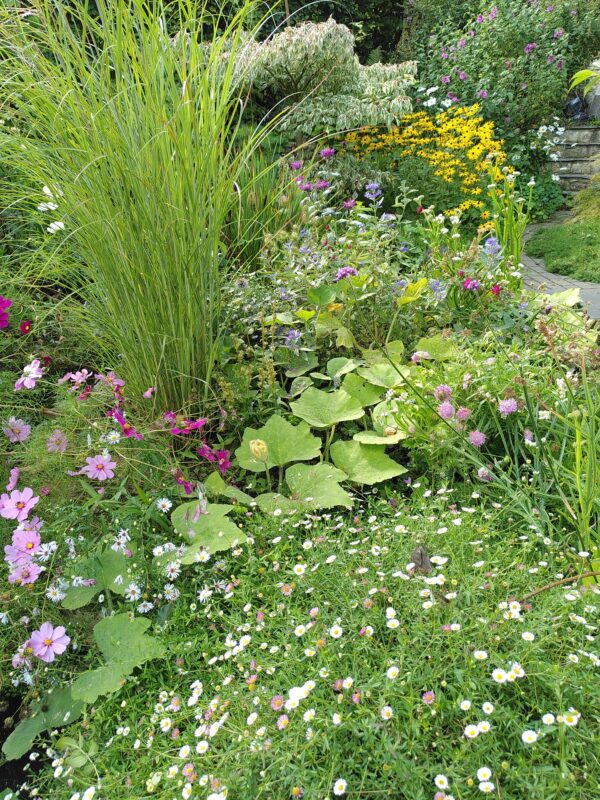
How do I garden? I mulch, I prune, I sow seeds, I weed, I lift and divide, I deadhead, I plant out. I sit around a lot drinking tea. How do you?

13 Responses
OMG – this is beautiful and true! Our gardens reflect who we are – how we try and fail and succeed and try again. They also make us who we are, because we can’t grow without being, testing, thinking, feeling. Marchelle – your garden is an inspiration because it shows us all that “novices” are not untalented, even when they are new to the craft. They take on the work of others, amend it, curate it, live with it, improve it, bring themselves to the fore. What a beautiful metaphor. Thanks Lisa for this great post!
@Kristin, So exactly true. <3
Very beautiful and evocative post. Makes me less afraid to try gardening more. I keep feeling I don’t “know enough” so I find it intimidating.
@KSL, I am sure you would be a beautiful gardener, with your eye. As Marchelle says, just move it around if it’s not happy:).
Oh for an English Country Garden. Such Privilege.
@TJ, It is such a beloved privilege, to have a piece of land to steward.
Aw, the life of a gardener Sounds ideal. Love the melange of plantings. Makes for a beautiful Saturday.
@Sandra Sallin, Thank you. I can see your new hillside garden in my mind’s eye. So very beautiful.
Such a gorgeous post and a balm for my heavy heart. It brightened my day. Thank you both so much, Lisa and Marchelle. <3
@Jess, Thank you for saying hello. <3
A wonderful, beautiful piece of writing! Thanks, Lisa, for introducing us to Marchelle (I’ve been following @afrofoliage for a while now, thanks to your introduction earlier) and to Marchelle for writing it. Such gifts from both of you.
This resonates so deeply within me, very much the way I’ve gardened throughout my life although rarely with this level of dedication and (obviously joyful) hard work.
And I’m equally resentful of someone who would say it’s not worth doing if not done properly. Some of us don’t have access to “properly,” and who’s defining “the right way,” anyway?!
Oh, I don’t know which is more sumptious, her words or her beautiful, layered and wonderful garden. Thank you SO much, dear Lisa!!! After so much sheltering and pausing and lingering,, you and Marchelle have made me want to be brave again and careless and joyful.
What a beautiful and evocative post, and such a lush and engaging garden. Marchelle’s approach resonates so deeply with me, and I am in awe of her dedication. I think we sometimes put too much faith in properly, when really we just need to do, to play, to pay attention, to hope for the best and to try again.